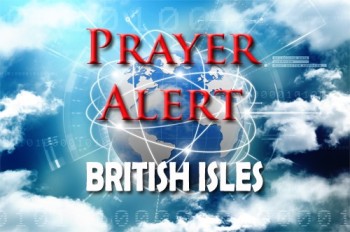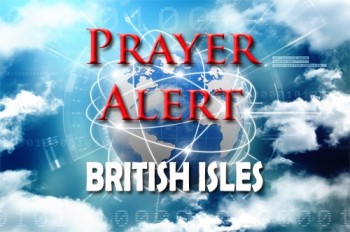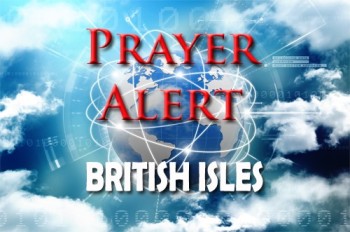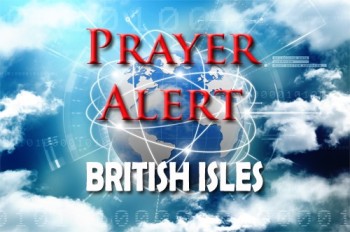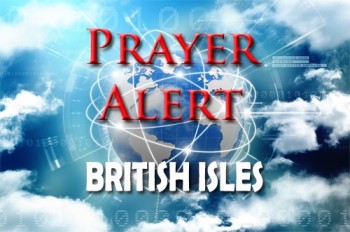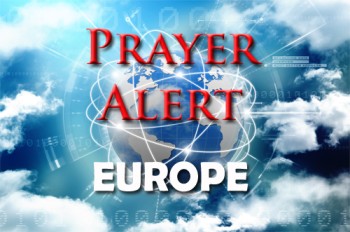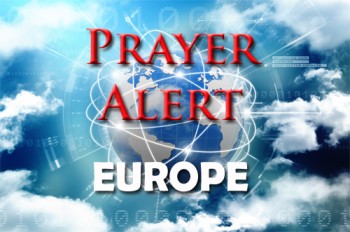
David Fletcher
David Fletcher is Prayer Alert’s Editor.
He is part of a voluntary team who research, proof-read and publish Prayer Alert each week.
If you would like to make a donation towards our running costs, please click here.
A growing spiritual awakening among Gen Z and Millennials is reflected in the testimony of filmmaker Michael Ray Lewis, a former atheist who has now turned to Christ. He says his unbelief was shaped by unanswered objections about evolution, evil, and judgment, reinforced by atheist media portraying Christianity as intellectually bankrupt. Determined to disprove his wife’s renewed faith, he began attending church and revisiting Christian claims. What started as resistance slowly turned into curiosity as Lewis discovered thoughtful responses to his questions and positive evidence for God’s existence. Scientific insights, particularly from astrophysics, challenged his assumption that faith and reason were incompatible. After several years, he realised that his remaining objections were rooted not in evidence but in unwillingness to believe. In 2016, he surrendered his life to Christ. Leaving behind his horror film career, he felt called to serve God creatively and produced the documentary Universe Designed, presenting compelling scientific and philosophical evidence for an intelligent Creator.
Six pro-life activists associated with the Red Rose Rescue movement are celebrating after all charges against them were dropped following a court hearing in Pennsylvania. The group had been arrested in July 2025 after intervening at an abortion clinic in Chester, actions they described as a peaceful ‘rescue’ aimed at offering alternatives to abortion and practical support to women and staff. The activists, who were charged with misdemeanour, trespass, and disorderly conduct, spent several days in custody before being released on bail. After they entered no-contest pleas, the court dismissed all charges, with no penalties imposed and bail money returned. During the proceedings, the defendants stated that their actions were motivated by Christian convictions, a belief in the dignity of every human life, and a desire to act non-violently on behalf of the unborn. They also referenced historic civil rights principles and the legacy of peaceful protest. The group expressed gratitude for legal support and for prayers offered, describing the outcome as a significant encouragement for those seeking to defend life with compassion, courage, and faith.
The Government has approved plans for a large new Chinese embassy near the Tower of London, ending years of debate over security concerns. The site, purchased by China in 2018 for over £200 million, would become the largest Chinese embassy in Europe. Ministers say national security has been their foremost consideration, stressing that intelligence agencies were involved throughout the process and that extensive mitigation measures are in place. However, critics across the political spectrum have condemned the decision. Conservative, Liberal Democrat, and Reform UK figures argue the embassy’s size and location could increase the risk of espionage and intimidation, particularly toward dissidents living in the UK. MI5 has acknowledged that security risks cannot be entirely eliminated, though it judged the safeguards to be proportionate. Supporters of the decision say approving the embassy reflects pragmatic engagement with a major global power and helps maintain diplomatic dialogue on trade, security, and human rights. Opponents warn it sends the wrong signals about Britain’s willingness to stand firm on national security and democratic values.
Momentum is growing in parliament for a ban on under-16s using social media, after the House of Lords backed a key amendment to the Children’s Wellbeing and Schools Bill. The proposal would require social media platforms to implement highly effective age-verification systems within a year of the law passing. While the Government initially resisted an outright ban, pressure from opposition parties, bereaved parents, charities, and Labour backbenchers has softened its stance. Many peers cited evidence of harm to children’s mental health, wellbeing, and development, sharing personal testimonies and research on the risks of excessive screen use. With similar restrictions already introduced in Australia, ministers are now consulting on how a UK ban might work in practice. The amendment now returns to the House of Commons, where overturning it could prove politically difficult. Government statements suggest action is increasingly likely, with a focus on helping children develop healthier relationships via phones and social media, while balancing evidence, parental concerns, and expert advice. A ban in some form now appears almost inevitable.
UK inflation has risen for the first time in five months, increasing to 3.4% in the year to December. The rise, though higher than expected, is widely attributed to temporary factors rather than a sustained upward trend. The Office for National Statistics said higher airfares over the Christmas and New Year period were a major contributor, alongside increased tobacco prices following a Budget tax rise. Food prices also edged up, notably for bread, cereals, and vegetables, adding pressure on household budgets. Despite the increase, analysts believe inflation is likely to fall again in the coming months. The Bank of England, which ended 2025 by cutting interest rates to 3.75%, is expected to proceed cautiously when it meets in February, with gradual cuts anticipated later in the year. The Government says reducing the cost of living remains a priority, while critics blame high taxes and borrowing for continued pressure on families. Compared with European neighbours, UK inflation remains relatively high, though forecasts suggest a decline is likely soon.
The Government has launched a £15 billion Warm Homes Plan aimed at expanding solar power, heat pumps, and other green technologies across households over the next five years. The scheme seeks to triple the number of homes with solar panels while increasing uptake of low-carbon heating. It includes a mix of grants and low or zero-interest loans, available regardless of household income. The Boiler Upgrade Scheme will be extended until 2029/30, offering grants of up to £7,500 for air-source heat pumps. An additional £600 million has been allocated to fully fund solar panels and battery storage for low-income households. It is estimated that combining solar, battery storage, and heat pumps could save an average household up to £1,300 a year. The plan is also expected to boost demand for skilled installers, creating opportunities for green-tech businesses and workforce training. Ministers say the programme supports decarbonisation, energy security, and cost-of-living relief, though experts stress the importance of improving insulation alongside new technologies.
MPs are debating plans to remove the immunity provision from legislation addressing unresolved crimes from the Northern Ireland Troubles. The Government is seeking approval for an order to overturn elements of the previous Legacy Act, including a scheme that would have granted immunity from prosecution to individuals involved in Troubles-related offences in exchange for cooperation with a truth recovery body. That scheme was ruled unlawful and never implemented. Northern Ireland secretary Hilary Benn said the changes are necessary to restore trust among victims’ families and communities who strongly oppose immunity for those responsible for violence and murder. The order would also lift restrictions on bringing new civil claims, reinstating the right of families to seek justice through the courts. In response to concerns among veterans’ groups that this could expose former members of the armed forces to repeated or unfair legal action, the Government intends to introduce safeguards for veterans, including limits on reinvestigation, health protections, anonymity provisions, and alternative ways of giving evidence.
The incoming Archbishop of Canterbury, Sarah Mullally, has defended the CofE’s £100 million slavery reparations fund amid growing political and internal opposition. Writing to MPs and peers calling for the plan to be scrapped, she said the Church must address its historic links to African chattel slavery with honesty, responsibility, and Christian integrity. The fund is intended to provide seed funding for community projects and enterprises serving those affected by the legacy of slavery. Critics, including several Conservative MPs, argue the money should instead support parish ministry, church buildings, and historic records, warning of legal and financial risks. Dame Sarah responded that the initiative does not reduce parish funding, noting that £1.6 billion has been committed to parishes over the next three years. However, polling suggests significant concern among churchgoers, with many saying parish ministry should take priority and warning they may redirect giving if the fund proceeds.
Tensions between the USA and Europe eased after Donald Trump reversed his threat to impose tariffs on European countries over Greenland and ruled out using force to seize the territory. Speaking in Davos, Trump said a new ‘framework’ had been agreed with NATO secretary-general Mark Rutte, focussing on Arctic security, minerals, and defence cooperation. While details remain vague, the move paused a looming trade dispute that had shaken transatlantic relations and raised fears about NATO’s future. Denmark welcomed the de-escalation but reaffirmed that Greenland’s sovereignty is non-negotiable. European leaders cautiously praised the shift, seeing it as a step away from confrontation. Analysts, however, do not believe that trust can be fully restored, warning that relations may stay fragile, with trade and security tensions ready to resurface.
Spain has entered a period of deep national grief following its deadliest rail disaster in more than a decade. A high-speed collision near Adamuz in southern Andalusia claimed at least 41 lives, with fears that the toll could still rise as recovery work continues. Two trains derailed on 18 January after one strayed into the path of another, and investigators are carefully examining the scene, focusing on a carriage believed to have derailed first. The transport minister said that experts were extremely surprised because it happened on a flat stretch of track which had been renovated in May. Mechanical failure is being considered; sabotage, human error, and excessive speed have been ruled out. Local residents were among the first to help the injured, facing scenes of profound trauma. As families wait anxiously for news and many remain in hospital, the country is observing days of mourning, united in sorrow and still searching for answers.



